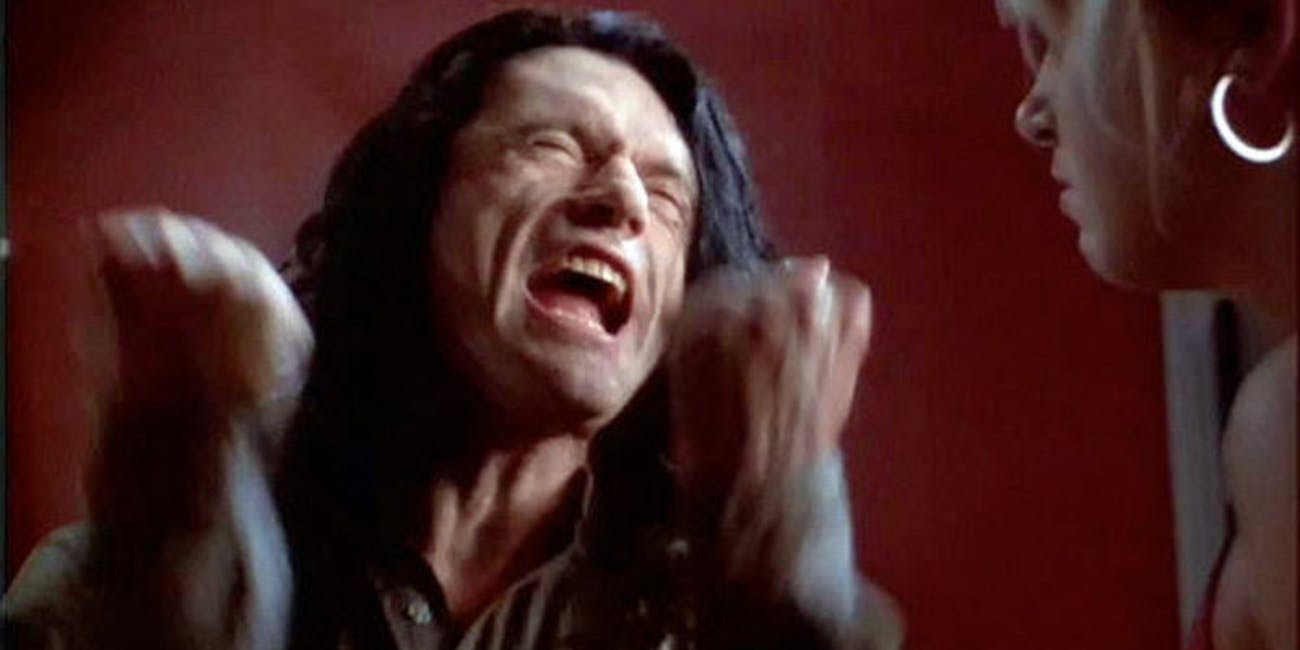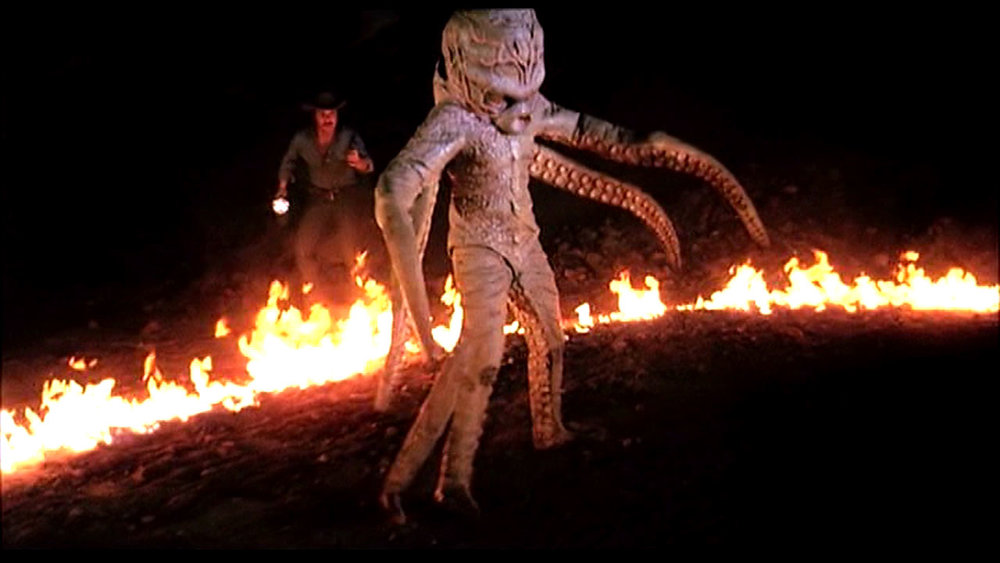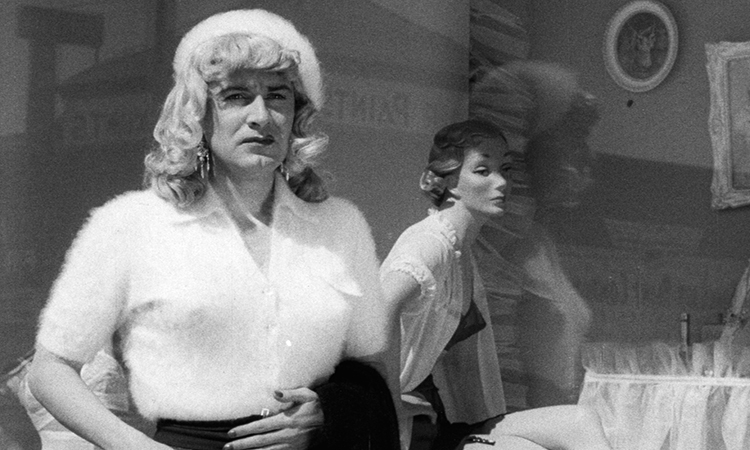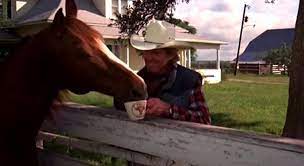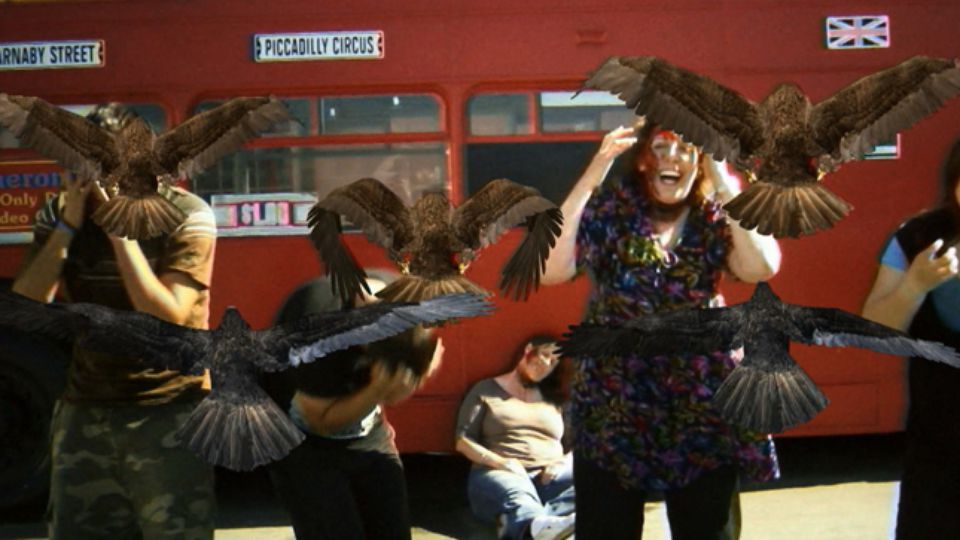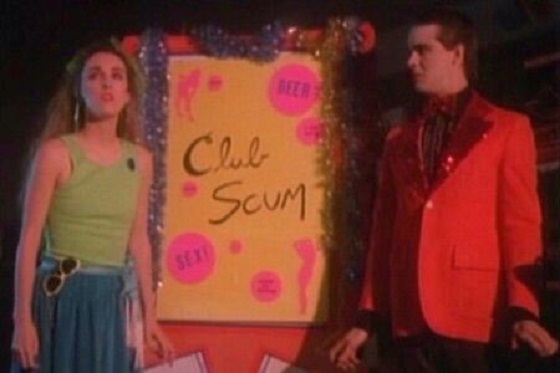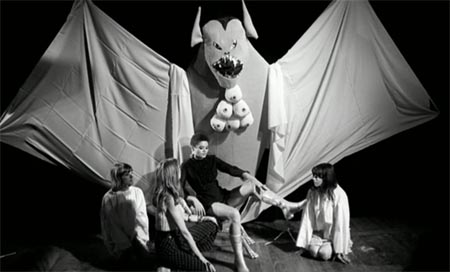
Some are born bad, some achieve badness, and some have badness thrust upon them.
The enjoyment of bad movies is commonplace. We scarcely need defenders of the seventh art, or even Pauline Kael to argue for us or explain how we can separate the notions of good and fun. Bad movies have their own legacy, generations of curators and levels of dissemination. After the Golden Turkey Awards and the Razzies, Re/Search's Incredibly Strange Films, cult books and clubs and midnight cult movie sessions, Mystery Science Theater 3000 (MST3K) and RiffTrax, we now have podcasts and live streams which have closed the circle on the more private social activity of watching a movie and making cracks about it.
But that may not tell us anything more than that presumptions are more widespread. What are we talking about when we talk about bad? Or what are we doing with it even when we don't talk about it? The curiosity is not squelched by the experience, and there are questions that aren't really closed, don't have definitive answers, but are put in play. The order here is not the pretense of imposing an overarching system, but what imposes itself by trying to keep track of the various thoughts, points, registers.
There's the double astonishment. Our reaction is not the reaction of the maker(s). And this brings up another point, which is how so many of the legendary bad movies are products of one person in control, writing, producing and directing, and in many cases taking the lead role. There's the compounding of the self-consciousness problem, where the maker(s) didn't have to or just didn't submit to review or approval by others. (There have been discussions with those who work on these films, cast and crew, in the case of Tommy Wisseau's The Room, and the MST3K/RiffTrax crew have had many encounters with people involved in these projects and even have them on their shows as guests, and discuss the reactions during the making as well as after.)
But defining or describing bad can also be easier than doing so for good or great. There's certainly the reflex for it, which is where riffing comes in. Are these just presumed values? Is bad relative to assumed or accustomed standards? There are certainly different aesthetic standards, tastes, cultural values, that can make a movie good for some but bad for others. But it seems there is a class of bad that falls short of a minimal competence, conception or aesthetic sense.
Perhaps the best form of this question is what to call this class, or its members. "Bad" can certainly describe all kinds of things that are not in this particular class. The term "B-movie" came from particular production methods in the old Hollywood studio system and its products were not all at such a rudimentary or shoddy level, though some certainly are in this class. ("C movie" and "Z movie" had their runs, and you might hear "z grade" every now and then.) "Worst," "worst movies," "worst movies ever" or "of all time" is a common way this type of movie is classed or assembled (see the Wikipedia page List of films considered the worst), but this also doesn't necessarily separate production level, competence or another important factor, the level of fun or enjoyment or entertainment precisely as bad (though perhaps it's best not to; see below), and it's a more unwieldly adjective or class name, too.
This leads us to the other quality, here. There are plenty of movies that aren't good or interesting or entertaining, and even plenty of movies that inspire antipathy but are not necessarily either incompetent or enjoyable. There's a class of bad that goes beyond just standard, average, or run-of-the-mill bad to astounding, enjoyable, or surreal. The experience of them crosses into novelty, amusement, fondness, even if ironic, and into camp and cult. Then comes the question, is it easier to enjoy bad movies than good ones? Is it a kind of security? Do we feel safer with something conspicuously bad, or easily or widely regarded as such, than with deciding what is good or exposing ourselves with what we identify as good? Is there a social factor to this, peer pressure or social coersion? Is it easier to share this sort of bad, to find common ground with it?
See fond etymology. This term may be the most suitable, because it covers, if in a circuitous, inadvertent way (only because we've forgotten its path), the foolish, irrational, indulgent and affectionate. Note also, on the same page, "fondle."
But as soon as you try to separate those, it seems they can't be disconnected. It gets fuzzier. Obviously there are movies like Manos: Hands of Fate or Fateful Findings where conception and execution are mercilessly, inextricably bound up. And of course this whole class of bad usually involves the wholistic approach, where the same conception or lack of applies to the means and execution. But there are also many movies that have competent production, acting, even direction -- and not even just a minimal level of that, but even quite above it -- that don't work or that seem wrongheaded or absurd or just awful. This would seem to separate conception, but sometimes this is something about execution itself, where the whole doesn't work from the sum of parts.
R.O.T.O.R. is a great specimen for this, for the way that conception can involve various parts, elements, without how they work as a whole, or at least a good sense of it. The very conceit of construction can be a derivative idea of these parts, these things a movie should have in them, and simply putting those together with no other reason, or no other sense what they should be for. So in R.O.T.O.R. you have establishing background scenes, voiceover, florid description, timestamp titles, comic relief characters (including a robot one), cutaway shots of desk items, but as just such a heap, and with no sense of proportion. Why, for example, is the day and time reported for the cowboy hero making breakfast, stretched out to elaborate the items of his countertop several times over, while in voiceover he muses about the "buttery sunlight"?
Competent but lacking may actually be another class, and perhaps the largest one of all, movies that aren't interesting enough or memorable, the run of the mill if not the bulk of them. In this sense, too, the movies here identified as bad are exceptional like the good or great movies in being more interesting, if not also more fun. Which is another way to get to this: bad movies break the rules like great ones. They're outside the lines. They violate the conventions that can make things, if not bad, simply regular, plain, not remarkable.
Since so many of these movies are also at the bottom of the scale of means of production, there is also the question of what constitutes even being a movie in the first place, as in a viable product, production or release, an entry worth consideration at all, and even moreso now with video. Does anything shot on a cell phone count for cinematic comparison? See the case of Things for this discussion, and The Badge, the Bible and Bigfoot below.
While certainly most if not all of these bad movies we know about have attained cult status to some extent, cult is not coextensive with this kind of bad. Any movie can become a cult movie. A really good movie that didn't get much attention when it came out can gather a cult following that brings it back to life. But the cult experience of this type of bad movie presses the issue of social status. There is some patness to the cult experience that makes me feel uncomfortable, like ganging up or bigotry. Denigration is a cheap way to feel superior.
The counter to that is seeing yourself in the effort or something about the conception, and the particular boomerang of reflection here are the conceits of high esteem, virtue, nobility, good values. In other words, where even the sense of good is held up in a bad way, so we can see it as vanity. In Birdemic: Shock and Terror, the protagonist is environmentally conscious. It's like a vanity hero for the writer/director imagining himself the scion of a big tech company selling solar panels. But it's childishly conceived, just pure statement, wish-fulfilment silliness. When you see it so trite, there's a cringe factor of self-consciousness, how anything can be a vanity. It makes you think, Oh god, is that what I'm doing when I think I'm being good or noble or superior in some way?
The triteness, how these sentiments are made pat, reductive, platitude, is often a factor of this vanity and vice versa. This is another way of bearing out what Marcel Mauss showed in his anthropological study of the gift, and what Nietzsche offered as insight about the selfish component of gifts and generosity. As with the gift, there's a way we use our altruism selfishly. Generosity, magnanimity, can be just as much about lording it over the other, and using social conventions that way, as with attempts to show someone up with a gift, and creating a gift war, like the potlatches Mauss described. The un-self-consciousness at this level exposes this as well. Neil Breen may be the best model of this pure vanity of imagination boiled down to the barest means. See, for example, Fateful Findings, though he has others.
I woke from a nap to my first encounter with Robot Monster. I didn't think I was still asleep, but that I was still in that leftover dream logic. The more I woke, the more I was thrilled the patchwork silliness persisted. The movie has its own excuse -- that it's the dream of a child character in it -- but that doesn't stop the very adult childish absurdity from creating the surreal effect: gorilla suit with diving helmet, impromptu sign language for hiding lovers, picnic among the rocks, walking -- gorilla suit plodding -- shots looped for only dreamlike ineffectual effect, bubbles!
Rape of the Vampire is an inadvertent Godard movie.
Incredulity and laughter may be kneejerk with something like The Room or Manos: Hands of Fate, but we don't hate, scorn, revile Tommy Wiseau or Ed Wood. Perhaps the worst we do is feel sorry for them, or have a kind of empathy mingled with admiration for their ability to be so un-self-conscious. There is a danger about the kind of adulation that comes about for these great bad movies, a kind of smugness that goes beyond any comment or recognition, so taken for granted, similar to the kind of smug assurance of a busybody interest in the misfortune of others, not far from the cheap derogation of bigots and bullies.
When we can feel good about justifying, if not absolving ourselves even of this, is when the project has all the money, glamor, fame, vanity and accomplishment that no longer gives them an excuse for the failure of means, when there is already, presumptively, everything that may be the source of so much wrong-headed ambition, a trite notion of fame, a squalid grandeur. Then we can let go on the source of vanity that seems to have everything that Harold P. Warren or Neil Breen wants or lacks. We can feel sorry for Wiseau like we do Don Quixote, and the entertainment is still at his expense. We don't need to feel sorry for Kevin Costner or Mel Gibson for the same vanity that somehow their making it never disabused them of.
This is why -- at least my -- contempt is specially reserved for movies that are supposed to be prestige, parade floats that sometimes have their very technical competence, production extravagance, industry wisdom to blame for being able to have wrought their conceit on the world -- for just how awful they are. That's why the true hall of infamy, of contempt, is reserved for movies like Dances with Wolves, Braveheart, Forrest Gump, Titanic, Shakespeare in Love, American Beauty, Slumdog Millionaire, pretty much every Oscar winner for the last 40 years. And in fact, the Oscars have become the very index of this level of bad, wilfully rivaling the Grammys for irrelevance. A movie like Titanic has nothing over on these legendary bad films for childish plot.
Virus Shark
Killer Raccoons! 2! Dark Christmas in the Dark!
African Kung-Fu Nazis
The extra special level of contempt-worthiness we're dealing with, here, with Christian bad movies -- and there's a multitude of them now, because of movie-, or video- making becoming so widely accessible -- cheaper, sure, but that's the means for so much badness -- is of course the self-righteousness. Christian movies aren't just bad, they're preaching their goodness at you. It's hard to avoid hypocrisy when you make right absolute.
For example, The Badge, The Bible and Bigfoot: this movie really does look like they went out in the woods and shot with cell phones. And if these are gifts from God, I don't know what to make of real writers, singer songwriters, directors and actors. I guess the devil has far better taste, but he is more worldly. There is a Christian song soundtrack by the husband / music company CEO / co-star that is a -- ahem -- phenomenon in its own right -- so the bare-bones, pre-teens with a camera style plot is forming to these gratingly earnest songs that sound like 12-step program cant -- and then after it climaxes with a fist fight with a monkey suit -- no joke, literally -- it turns out it was all a dream, with the Christian twist that the husband decides all those violent movies are having a bad effect on him and he's going to stop watching them. And then some scripture to weld all that down. Talk about your dopey hypocrisy level having your cake and eating it too. "Writer/director" Ashley has obviously seen enough movies to know what trendy techniques to copy, but not enough to be ashamed of herself.
This couple alone has made 39 of these movies! Which goes back to the matter of the minimum criteria for consideration: what constitutes a movie, product, release? As discussed with Things above.
But that may not tell us anything more than that presumptions are more widespread. What are we talking about when we talk about bad? Or what are we doing with it even when we don't talk about it? The curiosity is not squelched by the experience, and there are questions that aren't really closed, don't have definitive answers, but are put in play. The order here is not the pretense of imposing an overarching system, but what imposes itself by trying to keep track of the various thoughts, points, registers.
Why is bad so obvious? Is it more obvious than good?
Even if we don't know how to define bad, we know it when we see it. The laughter that can be the reflex might be like the abruptness of incongruity, the disruption of the daily order, of slipping on a banana peel, regardless of other consequences. It's the slipping on the banana peel of the frame itself, the show, the means and presentation, and not just what happens in it. There can be the fascination of a car wreck, but the figurative sense here makes this even more like, indeed, an anatomy lesson. It's a car wreck that was mapped out.There's the double astonishment. Our reaction is not the reaction of the maker(s). And this brings up another point, which is how so many of the legendary bad movies are products of one person in control, writing, producing and directing, and in many cases taking the lead role. There's the compounding of the self-consciousness problem, where the maker(s) didn't have to or just didn't submit to review or approval by others. (There have been discussions with those who work on these films, cast and crew, in the case of Tommy Wisseau's The Room, and the MST3K/RiffTrax crew have had many encounters with people involved in these projects and even have them on their shows as guests, and discuss the reactions during the making as well as after.)
But defining or describing bad can also be easier than doing so for good or great. There's certainly the reflex for it, which is where riffing comes in. Are these just presumed values? Is bad relative to assumed or accustomed standards? There are certainly different aesthetic standards, tastes, cultural values, that can make a movie good for some but bad for others. But it seems there is a class of bad that falls short of a minimal competence, conception or aesthetic sense.
Perhaps the best form of this question is what to call this class, or its members. "Bad" can certainly describe all kinds of things that are not in this particular class. The term "B-movie" came from particular production methods in the old Hollywood studio system and its products were not all at such a rudimentary or shoddy level, though some certainly are in this class. ("C movie" and "Z movie" had their runs, and you might hear "z grade" every now and then.) "Worst," "worst movies," "worst movies ever" or "of all time" is a common way this type of movie is classed or assembled (see the Wikipedia page List of films considered the worst), but this also doesn't necessarily separate production level, competence or another important factor, the level of fun or enjoyment or entertainment precisely as bad (though perhaps it's best not to; see below), and it's a more unwieldly adjective or class name, too.
This leads us to the other quality, here. There are plenty of movies that aren't good or interesting or entertaining, and even plenty of movies that inspire antipathy but are not necessarily either incompetent or enjoyable. There's a class of bad that goes beyond just standard, average, or run-of-the-mill bad to astounding, enjoyable, or surreal. The experience of them crosses into novelty, amusement, fondness, even if ironic, and into camp and cult. Then comes the question, is it easier to enjoy bad movies than good ones? Is it a kind of security? Do we feel safer with something conspicuously bad, or easily or widely regarded as such, than with deciding what is good or exposing ourselves with what we identify as good? Is there a social factor to this, peer pressure or social coersion? Is it easier to share this sort of bad, to find common ground with it?
What is the disposition of, with or towards bad?
This leads to two main divisions: affectionately bad (or fond badness, more on that term) and contemptibly bad. The bad that is so obvious is often admirable for other reasons. The movie Ed Wood, about one of the most legendary bad movie makers, made this argument well, a kind of basic auteur freedom principle: let the person make what they want. The result may be Glen or Glenda, or it may be Citizen Kane. We admire the tenacity even if not the result, and even the pangs or cringes of sympathy we have with such obviously bad is not the same as true contempt. That is reserved for -- see below.See fond etymology. This term may be the most suitable, because it covers, if in a circuitous, inadvertent way (only because we've forgotten its path), the foolish, irrational, indulgent and affectionate. Note also, on the same page, "fondle."
What are the factors of bad?
Is this a matter of kind or degree? What are the different axes on which it spins? Sometimes it seems this can be broken down into distinct parts, like: conception, competence, execution. Or perhaps the more practical parts: script, production design and execution, photography, direction, acting.But as soon as you try to separate those, it seems they can't be disconnected. It gets fuzzier. Obviously there are movies like Manos: Hands of Fate or Fateful Findings where conception and execution are mercilessly, inextricably bound up. And of course this whole class of bad usually involves the wholistic approach, where the same conception or lack of applies to the means and execution. But there are also many movies that have competent production, acting, even direction -- and not even just a minimal level of that, but even quite above it -- that don't work or that seem wrongheaded or absurd or just awful. This would seem to separate conception, but sometimes this is something about execution itself, where the whole doesn't work from the sum of parts.
R.O.T.O.R. is a great specimen for this, for the way that conception can involve various parts, elements, without how they work as a whole, or at least a good sense of it. The very conceit of construction can be a derivative idea of these parts, these things a movie should have in them, and simply putting those together with no other reason, or no other sense what they should be for. So in R.O.T.O.R. you have establishing background scenes, voiceover, florid description, timestamp titles, comic relief characters (including a robot one), cutaway shots of desk items, but as just such a heap, and with no sense of proportion. Why, for example, is the day and time reported for the cowboy hero making breakfast, stretched out to elaborate the items of his countertop several times over, while in voiceover he muses about the "buttery sunlight"?
Competent but lacking may actually be another class, and perhaps the largest one of all, movies that aren't interesting enough or memorable, the run of the mill if not the bulk of them. In this sense, too, the movies here identified as bad are exceptional like the good or great movies in being more interesting, if not also more fun. Which is another way to get to this: bad movies break the rules like great ones. They're outside the lines. They violate the conventions that can make things, if not bad, simply regular, plain, not remarkable.
Since so many of these movies are also at the bottom of the scale of means of production, there is also the question of what constitutes even being a movie in the first place, as in a viable product, production or release, an entry worth consideration at all, and even moreso now with video. Does anything shot on a cell phone count for cinematic comparison? See the case of Things for this discussion, and The Badge, the Bible and Bigfoot below.
What is the identification with bad?
This special class of bad has a camp or cult factor. But that requires qualification as well. While camp may be the manner in which these films are enjoyed, they are certainly distinct from camp themselves. Movies, or any art, made as camp are trying to be funny, ironic, or even bad in a way that is mucking or fucking with form or convention, sometimes with that as the very point. Jon Waters and Russ Meyer are two different examples. Waters imitated inadvertently bad movies, and if he reached other heights, it was as much notorious as bad, and for flouting other conventions as much with the movie ones. Going in almost the opposite direction, Meyer, for as much as he fits the profile of these disconnected auteurs, worked up his own style of burlesque. It was a shtick no matter how thick. What seems quite common to our class: earnestness is part of the folly, part of the cringe factor. Even in the cases where they try to be humorous.While certainly most if not all of these bad movies we know about have attained cult status to some extent, cult is not coextensive with this kind of bad. Any movie can become a cult movie. A really good movie that didn't get much attention when it came out can gather a cult following that brings it back to life. But the cult experience of this type of bad movie presses the issue of social status. There is some patness to the cult experience that makes me feel uncomfortable, like ganging up or bigotry. Denigration is a cheap way to feel superior.
The counter to that is seeing yourself in the effort or something about the conception, and the particular boomerang of reflection here are the conceits of high esteem, virtue, nobility, good values. In other words, where even the sense of good is held up in a bad way, so we can see it as vanity. In Birdemic: Shock and Terror, the protagonist is environmentally conscious. It's like a vanity hero for the writer/director imagining himself the scion of a big tech company selling solar panels. But it's childishly conceived, just pure statement, wish-fulfilment silliness. When you see it so trite, there's a cringe factor of self-consciousness, how anything can be a vanity. It makes you think, Oh god, is that what I'm doing when I think I'm being good or noble or superior in some way?
The triteness, how these sentiments are made pat, reductive, platitude, is often a factor of this vanity and vice versa. This is another way of bearing out what Marcel Mauss showed in his anthropological study of the gift, and what Nietzsche offered as insight about the selfish component of gifts and generosity. As with the gift, there's a way we use our altruism selfishly. Generosity, magnanimity, can be just as much about lording it over the other, and using social conventions that way, as with attempts to show someone up with a gift, and creating a gift war, like the potlatches Mauss described. The un-self-consciousness at this level exposes this as well. Neil Breen may be the best model of this pure vanity of imagination boiled down to the barest means. See, for example, Fateful Findings, though he has others.
The Fashion of Badness (Badness of the Day)
There are distinctive kinds of badness for time periods, not just because of the means of production, but also because the level of hackish derivation common to all eras exacerbates trendiness and fads and affectations of each one. Do you think rock 'n' roll tics or beatnik lingo or beach parties from the 50s and 60s are squirrelly? How about that pinch of familiarity when you see something from your own formative years that's bottom-of-the-barrel style aspiration or pandering? It's like looking in a funhouse mirror and seeing every feature grossly exaggerated. For me, this point was driven home by Hobgoblins for the 80s. Click the title for a rundown.Transcendant Badness
There is a degree of badness, of whatever kind -- whether incompetence or conception, most often both -- such that the work becomes -- stumbles into, accidentally achieves -- its own distinct expressiveness, or even the surreal. These are very special cases that show the accidental at work in all art from the other end of the spectrum. They may not be either as actually boring or as enjoyable as some other great bad works, but they are something very special to behold, often like the dream fragments at the shoreline of sleep and waking. To me, Plan Nine from Outer Space is actually boring, and once the novelty and astonishment wear off, it's a dreary plot, like what your pre-teens might have come up with shooting video in the back yard. A movie like Samurai Cop or even Jean Rollin's own The Grapes of Death can bring fits of gut laughter, precisely because there is no mistaking them for intended humor -- well, or at least successful attempts. But even Rollin is among the list of examples of the transcendent, showing how elusive hitting "it" is even for auteurs of infamy: Rape of the Vampire stands up there with Robot Monster and Glen or Glenda as crashing into art.I woke from a nap to my first encounter with Robot Monster. I didn't think I was still asleep, but that I was still in that leftover dream logic. The more I woke, the more I was thrilled the patchwork silliness persisted. The movie has its own excuse -- that it's the dream of a child character in it -- but that doesn't stop the very adult childish absurdity from creating the surreal effect: gorilla suit with diving helmet, impromptu sign language for hiding lovers, picnic among the rocks, walking -- gorilla suit plodding -- shots looped for only dreamlike ineffectual effect, bubbles!
Rape of the Vampire is an inadvertent Godard movie.
True Contempt
Special reserve hatred, to make a very clear distinction: The particular vanity of the prestige project deserves the unqualified hatred, the kind of spite we justify as debunking. It could be argued that every project has some conceit that it's good, if not great, at least of worthiness, even if the most crass kind of just being a hit, or even a shrewd and easy hit, to rake in dough. But the hatred should befit the station, or at least be relative to the grandeur.Incredulity and laughter may be kneejerk with something like The Room or Manos: Hands of Fate, but we don't hate, scorn, revile Tommy Wiseau or Ed Wood. Perhaps the worst we do is feel sorry for them, or have a kind of empathy mingled with admiration for their ability to be so un-self-conscious. There is a danger about the kind of adulation that comes about for these great bad movies, a kind of smugness that goes beyond any comment or recognition, so taken for granted, similar to the kind of smug assurance of a busybody interest in the misfortune of others, not far from the cheap derogation of bigots and bullies.
When we can feel good about justifying, if not absolving ourselves even of this, is when the project has all the money, glamor, fame, vanity and accomplishment that no longer gives them an excuse for the failure of means, when there is already, presumptively, everything that may be the source of so much wrong-headed ambition, a trite notion of fame, a squalid grandeur. Then we can let go on the source of vanity that seems to have everything that Harold P. Warren or Neil Breen wants or lacks. We can feel sorry for Wiseau like we do Don Quixote, and the entertainment is still at his expense. We don't need to feel sorry for Kevin Costner or Mel Gibson for the same vanity that somehow their making it never disabused them of.
This is why -- at least my -- contempt is specially reserved for movies that are supposed to be prestige, parade floats that sometimes have their very technical competence, production extravagance, industry wisdom to blame for being able to have wrought their conceit on the world -- for just how awful they are. That's why the true hall of infamy, of contempt, is reserved for movies like Dances with Wolves, Braveheart, Forrest Gump, Titanic, Shakespeare in Love, American Beauty, Slumdog Millionaire, pretty much every Oscar winner for the last 40 years. And in fact, the Oscars have become the very index of this level of bad, wilfully rivaling the Grammys for irrelevance. A movie like Titanic has nothing over on these legendary bad films for childish plot.
Cheating into the Game
What about all the derivative levels? The levels that have now developed of trying to achieve bad movie, such as with the Sharknado series, have muddied the issue of whether this level of badness can be intended, aimed for. And there are even levels of competence for this. There are now even really bad attempts to make humorous bad movies. Compare:Virus Shark
Killer Raccoons! 2! Dark Christmas in the Dark!
African Kung-Fu Nazis
Bonus Round: The Special Case of Particularly Vile Christian Badness
Among its many other dubious distinctions, Saving Christmas -- its more proper and onerous title, Kirk Cameron's Saving Christmas -- provides a case of a truly badly conceived and executed movie that requires no sympathy whatsoever. There's no end to counting the kinds and amount of contempt for this. It's pushy, smug, smarmy, ingratiating, disingenuous, conniving, and not a hint of anything like holiday spirit. It's like going to an already lame Christmas party and then being buttonholed by a Christian wack job, except it's got even more capitalist casuistry being passed as apologist casuistry, cable show style historic dramatizations to act as the biblical fact backing up the arguments, which are also for shameless cultural appropriation of any kind, and then, to bear that out in the sickliest way, white people breakdancing in a McMansion, one of those kitchens that looks like part of a public swimming facility.The extra special level of contempt-worthiness we're dealing with, here, with Christian bad movies -- and there's a multitude of them now, because of movie-, or video- making becoming so widely accessible -- cheaper, sure, but that's the means for so much badness -- is of course the self-righteousness. Christian movies aren't just bad, they're preaching their goodness at you. It's hard to avoid hypocrisy when you make right absolute.
For example, The Badge, The Bible and Bigfoot: this movie really does look like they went out in the woods and shot with cell phones. And if these are gifts from God, I don't know what to make of real writers, singer songwriters, directors and actors. I guess the devil has far better taste, but he is more worldly. There is a Christian song soundtrack by the husband / music company CEO / co-star that is a -- ahem -- phenomenon in its own right -- so the bare-bones, pre-teens with a camera style plot is forming to these gratingly earnest songs that sound like 12-step program cant -- and then after it climaxes with a fist fight with a monkey suit -- no joke, literally -- it turns out it was all a dream, with the Christian twist that the husband decides all those violent movies are having a bad effect on him and he's going to stop watching them. And then some scripture to weld all that down. Talk about your dopey hypocrisy level having your cake and eating it too. "Writer/director" Ashley has obviously seen enough movies to know what trendy techniques to copy, but not enough to be ashamed of herself.
This couple alone has made 39 of these movies! Which goes back to the matter of the minimum criteria for consideration: what constitutes a movie, product, release? As discussed with Things above.
More specimens:
Birdemic 2: The Resurrection
Birdemic 3: Sea Eagle
Hobgoblins 2
Hack-o-Lantern
A*P*E
Jurassic Shark
Gumby: The Movie
Alien 2: On Earth
Santa and the Ice Cream Bunny
Santa Clause
Feeders 2: Slay Bells
Walk the Dark Street
Nukie
The Legend of Boggy Creek
Me You Madness
Cosmic Sin
Triassic Hunt
When Dinosaurs Ruled the Earth
The VelociPaster
Cry Wilderness
Birdemic 2: The Resurrection
Birdemic 3: Sea Eagle
Hobgoblins 2
Hack-o-Lantern
A*P*E
Jurassic Shark
Gumby: The Movie
Alien 2: On Earth
Santa and the Ice Cream Bunny
Santa Clause
Feeders 2: Slay Bells
Walk the Dark Street
Nukie
The Legend of Boggy Creek
Me You Madness
Cosmic Sin
Triassic Hunt
When Dinosaurs Ruled the Earth
The VelociPaster
Cry Wilderness
Best Worst Movies
Transcendant:
Robot Monster
Rape of the Vampire
Glen or Glenda
Enjoyable:
Samurai Cop
Octaman
R.O.T.O.R.
The Sidehackers
Aghastliness:
Manos Hands of Fate
The Room
Fateful Findings
Birdemic: Shock and Terror
Saving Christmas
True contempt:
Natural Born Killers
Dances with Wolves
Braveheart
Links
Movie Brains
Movie comments
Index
Best by year
Movie calendar
Film/Script
Fixion home
About
© 2022 Greg Macon. Banner image from Robot Monster.
